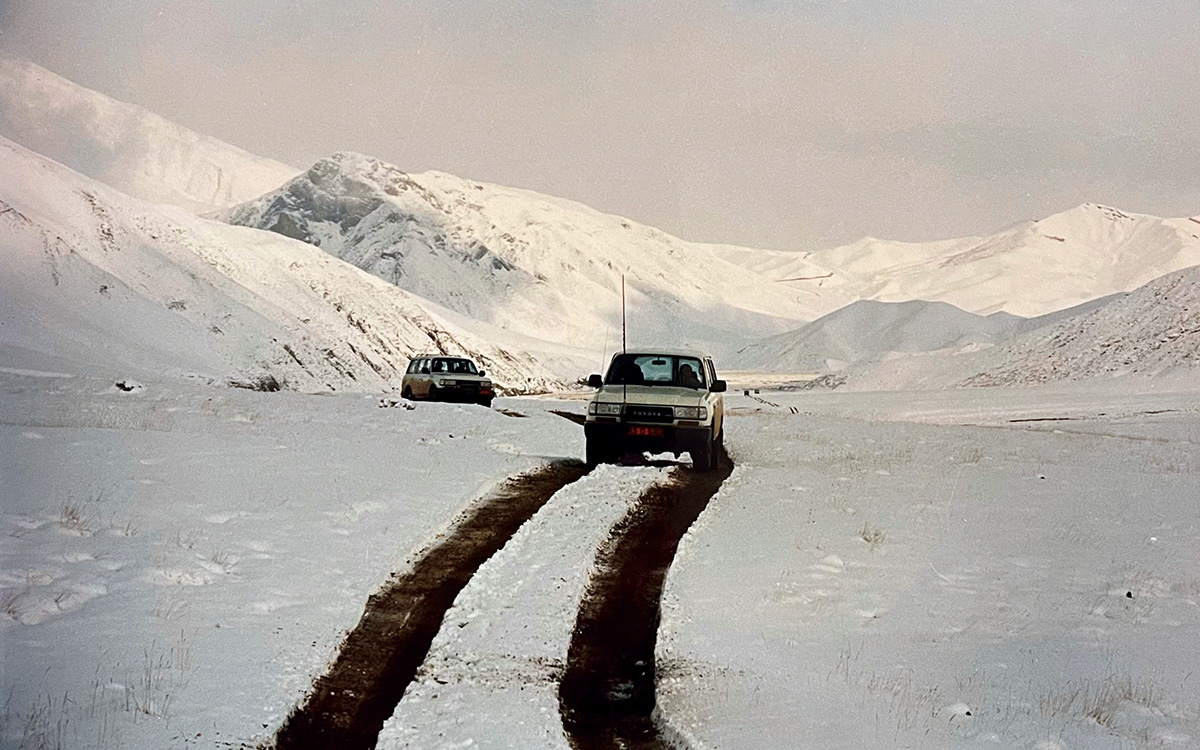Let’s Talk About the Mail
Letter from the Editor
BY SHAWN DORMAN

On the road to Bishkek, circa 1994.
Shawn Dorman
This month as part of our centennial commemorations, we spotlight your Foreign Service stories through the decades with a Focus on oral histories from the Association for Diplomatic Studies and Training and the Diplomatic Security Service. We also feature a Straight from the Source look at State’s new learning policy, and more. Instead of previewing all the excellent articles this month, I want to direct your attention here to an important FSJ logistical development.
Some 30 years ago, I started reading The Foreign Service Journal at my first post, Kyrgyzstan, a small new country in post-Soviet Central Asia. Its tiny new American embassy was not easy to reach. No commercial flights flew in or out of the country.
We received mail maybe once a month when someone would drive over the mountains, if snow didn’t close the pass, to Kazakhstan’s then-capital Almaty to pick up the Bishkek pouch. The Journal was a lifeline—a connection to home, to the Foreign Service and the State Department, and to AFSA, headed by Tex Harris at the time.
Back in those days, people sent change-of-address cards when they moved. The whimsical postcard announcement my brother, Josh, drew for me has been taped to my filing cabinet all these years. It brings a smile today, as I write on the FSJ’s new pouch mail arrangement.
As of January 1, by agreement with the State Department after extensive negotiations, AFSA has shifted its use of the pouch. Instead of bulk mailing _FSJ_s to members with pouch addresses, we are now sending five to 10 copies of each new edition to each community liaison office coordinator (CLO) for embassy communities.
Because mail options, even to smaller posts like Bishkek, have greatly expanded, most posts have alternative mailing addresses (DPO, APO, FPO, etc.), and a majority of FS members no longer rely on the pouch for their mail. Any AFSA member using a non-pouch address will continue to receive the magazine that way, and we encourage those using pouch addresses who want to receive the print magazine to send us an alternate, non-pouch address.
If you are at a pouch-only post and cannot get a copy from the CLO, please reach out to us, and we’ll take care of you. But we urge you to try the CLO first. This change is already reducing waste from copies going to out-of-date addresses (for those who move and do not inform AFSA), lessening our environmental footprint, and lightening the load on pouch facility colleagues and those who manage mailrooms at posts worldwide.
If you enjoy reading the hard copy, by all means, we want to send it to you! But you absolutely must update your mailing address and keep it up to date. AFSA does not get any address changes automatically—they have to come from you.
Please take a moment and go into your AFSA account online (https://ams.afsa.org/eweb/) and update your mailing address. Always use a non-pouch address if you have one.
We know reading habits have changed. If you currently prefer to read online, want to help save resources, or do not plan to update your mailing address regularly, please let us know and opt out of the print copy. You can always opt back in later. Send a quick note to journal@afsa.org with “opt out of print” in the subject line. Include your name, agency, and current mailing address.
For maximum reach and accessibility, we post the entire Foreign Service Journal online each month in three formats: HTML, Flipping Book, and PDF. We send out an AFSAnet message when the new edition is launched online at the beginning of the month. We also offer a weekly “FSJ Insider” email including links to the new articles and other content.
Also find FSJ content through the FSJ LinkedIn page, on all the AFSA social media channels, and in our searchable archive online that houses every edition back to 1924 (and the Consular Bulletin before that).
Thank you for helping us keep up with you. And please do keep reading—and writing for—the Journal.
When sharing or linking to FSJ articles online, which we welcome and encourage, please be sure to cite the magazine (The Foreign Service Journal) and the month and year of publication. Please check the permissions page for further details.

